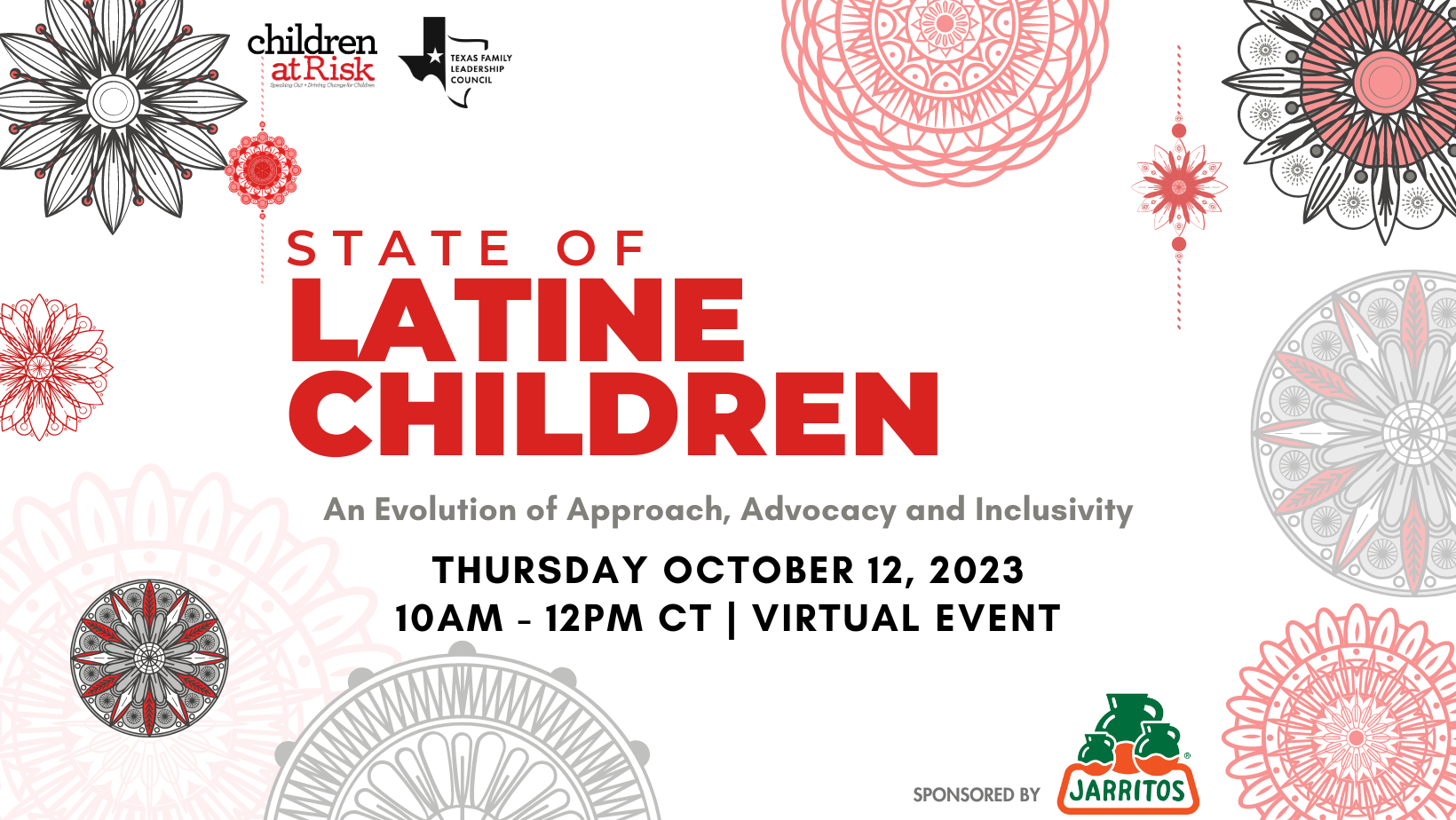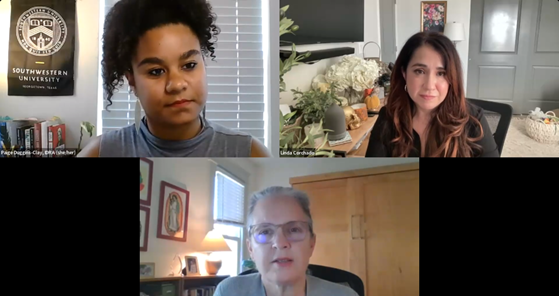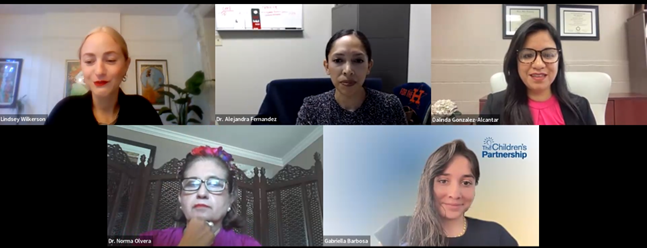
The 2023 State of Latine Children Summit hosted on October 12th, 2023. Welcome remarks were provided by the emcee of the event, Dalinda Gonzalez- Alcantar, President of the Boys & Girls Club in McAllen.
“Much of the Latin Population is concentrated in metropolitan areas, which is possibly attributable to the availability of resources and community and urban hubs, but it also really points to the need for these cities and states to pay attention to disparities that may be present in accessing basic needs and services.”- Leila Mizali, Director, Center for Social Measurement & Evaluation at CHILDREN AT RISK
A Data Overview was presented by Leila Mizali, Director, Center for Social Measurement & Evaluation at CHILDREN AT RISK. She provided an overview of the growth and characteristics of the Latine community in the United States. In 2021, there were 62.5 million Latine individuals, comprising about 19% of the total population, a significant increase from just 7% in 1980. Growth is primarily due to established communities rather than new migration, with US-born children between 5 and 17 years-old being the largest demographic.
The Latine population is exceptionally young, with 53% of US-born Latine individuals aged 5 to 29. The concentration of this population is highest in five states (California, Texas, Florida, New York, Arizona), reflecting general population density trends. Many Latine people reside in metropolitan areas, indicating a need to address disparities in accessing basic needs and services.
While there have been improvements in post-secondary enrollment and tertiary educational attainment, disparities still exist, with only 20% of Latine adults having completed tertiary education. However, there is promise in enrollment growth. Additionally, there has been an increase in Latine representation in elected governance, although continued efforts are needed to advance equity for Latine individuals at all levels of government.
“Some of the major challenges is getting the trust of this population, getting them to trust you and connect with you.” – Dr. Alejandra Fernandez, Assistant Professor at UT Health Houston School of Public Health
The Health Panel was, moderated by Lindsey Wilkerson, Director of Health and Special Projects at CHILDREN AT RISK. The panelists included Dr. Norma Olvera, Professor, Psychological, Health, and Learning Sciences Department at University of Houston; Dr. Alejandra Fernandez, Assistant Professor at UT Health Houston School of Public Health; Gabriella Barbosa, Managing Director of Policy, at The Children’s Partnership. Discussion began with a focus on addressing health disparities in Latine communities. Panelists highlighted the need for inclusive healthcare policies that consider factors like language, immigration status, and cultural beliefs. Dr. Olvera discussed the pressing health challenges faced by Latine children, emphasizing the impact of social determinants, harsh immigration laws, and stigma on mental and physical health. Obesity, food scarcity, and mental health issues were identified as key concerns, worsened by the COVID-19 pandemic and natural disasters. Dr. Olvera also mentioned the importance of considering cultural beliefs in healthcare, such as understanding how Latine families perceive and manage health issues. Additionally, the discussion highlighted the assets within Latine communities and the need to tap into them to promote healthier lifestyles and address health disparities.
Gabriela from the Children’s Partnership in California discussed five promising policy initiatives: the need for disaggregated data to understand health inequities, child tax credits lifting children out of poverty, expanding food assistance programs to include undocumented children, creating Hope Accounts for youth who lost primary caregivers due to COVID-19, and implementing peer-to-peer mental health programs in high schools.
Dr. Fernandez emphasized the challenges in researching health outcomes for the Latine population, including building trust, working with community organizations, and providing culturally adapted resources and interventions. Dr. Olvera highlighted the role of community organizations and coalitions in advocating for better health outcomes and discussed initiatives to increase representation in healthcare professions.
Overall, the panel emphasized the importance of community engagement, culturally tailored interventions, and policy changes to address health disparities among Latine children and youth. These efforts aim to promote better health outcomes and access to healthcare services in the Latine community.
Health Panel Participants
“It’s heartbreaking to see that the Supreme Court is assuming that we can just remove race from the equation as though race is not a factor in every element of public education” – Gini Pupo-Walker, Executive Director at Education Trust- Tennessee
In the panel titled “Landscape After the End of Affirmative Action,” the discussion focused on the implications of the recent Supreme Court decision on affirmative action and its impact on educational opportunities for Latine students. Linda Corchado, Director Children’s Immigration Network at CHILDREN AT RISK moderated the panel. It featured Gini Pupo-Walker, Executive Director at Education Trust- Tennessee, and Paige Duggins-Clay, J.D., Chief Legal Analyst at Intercultural Development Research Association as speakers.
The Supreme Court’s 6-3 decision invalidated affirmative action programs , no affirmative action programs are allowed, claiming they illegally discriminate based on race and violate the equal protection clause. The decision, which challenged the role of affirmative action in promoting equal opportunities and dismantling systemic barriers, has significant consequences for Latine students, especially first-generation students.
The discussion highlighted the importance of post-secondary education as a pathway to economic success and social mobility. However, Latine students already face barriers to enrollment and success, which this decision exacerbated. Challenges include reduced access to advanced coursework, limited support systems, and low counselor-to-student ratios in high schools.
The conversation also touched on the broader attack on diversity, equity, and inclusion (DEI) efforts in higher education, as SB 17 passed in Texas, which will dismantle DEI offices and programs in higher-ed institutions starting Jan 1, 2024. These policies threaten to diminish the representation of faculty of color and hinder the success of Latine students.
To address these challenges, the panel emphasized the need to empower students to advocate for their rights, promote evidence-based strategies for equitable education, and call on states to invest in institutions that serve underrepresented students. Overall, the panel discussed the critical role of affirmative action and DEI efforts in higher education and the ongoing struggles to ensure equal opportunities for Latine students in the face of legal challenges and policy changes.
In the final part of the panel, the discussion revolved around the impact of recent legal rulings on affirmative action in college admissions. The panelists touched on several key points:
- Challenges and Advocacy: They emphasized the need to be prepared to challenge the tangible results of these rulings. State legislatures’ responses to the rulings are seen as potentially harmful to funding and support for students, and there is a call for advocacy efforts to ensure all voices are heard.
- Philanthropy: The impact of these rulings on philanthropic efforts was discussed. There is a hope that philanthropic organizations will step up to support institutions and organizations that serve underrepresented students and communities.
- Legal Challenges: The panelists acknowledged the challenges posed by special interest groups and individuals like Edward Blum, who have been coordinating attacks on civil rights, including affirmative action, and voting rights. Efforts to reverse historic gains in civil rights are a concern.
- Lessons and Strategies: The discussion also touched on strategies for promoting diversity and inclusion in higher education, mentioning the importance of recruitment, communication, and supporting students. The role of students themselves in advocating for their rights and experiences is highlighted.
- Resources and Recommendations: The panelists recommended looking at guidance from the Department of Education and reports from organizations like Legal Defense Fund for insights and recommendations on promoting equity in higher education.
- Student Voice: They emphasized that students’ voices are critical in this moment, and efforts should be made to mentor and support them in advocating for their rights and opportunities in education.
Overall, the panelists stressed the importance of continued vigilance and advocacy in the face of challenges to affirmative action, with a focus on supporting students and ensuring equal educational opportunities for all.

Landscape After the End of Affirmative Action Panelists
“We have to take our power back, especially here in Texas. We’re the majority and we need to start acting like it.” – Natalie Sánchez- Lopez, Executive Director & CEO of Latino Texas Policy Center
The final panel of the event was titled “Increasing Positive Representation.” The panel was moderated by José Eduardo Sánchez, Co-Founder of Tecolotl. The panelists included Marcelle Purdy, Actor, Director, Produce; Edward Castillo, Founder of Figure It Out Agency; Natalie Sánchez- Lopez, Executive Director & CEO of Latino Texas Policy Center; and Zeke Peña, a Cartoonist and Storyteller. They acknowledged the importance of representation in various sectors, including politics, policy, art, media, and urban planning and design.
The panelists, Marcelle, and Zeke discussed the challenges of accurate representation in the entertainment industry and media. Marcelle highlighted the stereotypical and one-dimensional roles often offered to Latine actors. She emphasizes the need for more diverse and nuanced portrayals and the importance of Latine writers and creators telling their own stories.
Zeke, a book illustrator, and writer discussed his work in children’s books and the importance of adding nuance to the narratives about Latines. He emphasized the need for diverse stories beyond immigration and being mindful of who is telling these stories.
Natalie, the Executive Director, and CEO of the Latine Texas Policy Center, delved into the underrepresentation of Latines in positions of power and its impact on policy development. She called for increased collaboration, solidarity, and resource-sharing within the Latine community to address systemic challenges effectively.
The discussion underscored the importance of diverse representation, authentic storytelling, and collective action to drive positive change for Latines in various fields.
In this final part of the panel transcript, the discussion centered on the importance of representation and support within the Latine community. The panelists emphasized the need to celebrate and uplift one another, rather than compete against each other. They highlighted the importance of collaboration, transparency, and community building.
Natalie and Zeke discussed the scarcity mentality that sometimes plagues the Latine community, where individuals feel they must compete for limited opportunities. They stressed the need to change this mindset and support each other’s success.
Edward talked about the significance of using technology to normalize his story and the stories of others. He mentioned how he turned down projects that only highlighted Latine culture during specific months and instead worked on normalizing his presence and contributions year-round.
Marcelle emphasized the importance of accurate representation in media and entertainment. She cited examples like the movie “Coco,” “In the Heights,” and “Spider-Verse” as positive representations of Latine culture and identity. She also encouraged supporting artists and creators who are working to portray diverse stories.
The panelists stressed the need for representation not only in cultural stories but also in everyday roles and positions. They advocate for uplifting each other, mentoring, and creating a supportive community to challenge existing stereotypes and biases
WATCH THE RECORDING
Thanks to our sponsor Jarritos and to our partners for their collaboration: Children’s Defense Fund Texas, Santa Maria Hostel, Partnership for Americas Children, Imm Schools, The Childrens Partnership, Children Now. To learn more about the Texas Family Leadership Council and our collaborative working groups, visit childrenatrisk.org/txflc/
Have questions about joining us as a sponsor or partner on an upcoming Learning Event? Reach out to learning@childrenatrisk.org
MORE LIKE THIS
Virtual Press Conference: CHILDREN AT RISK and Community Leaders on the Future of the Child Tax Credit
C@R and researchers, family policy experts, and community leaders will hold a press conference urging Congress to ensure that any revisions to the Child Tax Credit (CTC) maintain its proven support for working families. Media Contacts:Morgan Gerri,...
Recap: The State of Black Children in Texas 2025
On February 13, 2025, CHILDREN AT RISK presented the virtual learning summit The State of Black Children in Texas. Each year, the State of Black Children in Texas Summit serves as a call to action—a gathering place for experts, advocates, and community leaders...
Fall 2024 | Early Childhood Education Texas Tour
CHILDREN AT RISK's Early Childhood Texas Tour is coming to a city near you, and you won’t want to miss it. C@R is hitting the road with 12 in-person stops across the state, bringing together child care providers, community leaders, and anyone passionate about...
Recap | 2024 Texas Equity Tour
Written by Ashley Watts, Texas Racial Equity Collaborative (TREC) Doctoral Fellow and Briauna Derry, Associate Director of Media Activism. In 2021, the Texas Racial Equity Collaborative (TREC) first gathered, united in their belief that working together could bring...
2024 C@R Special Events
Special Eventsconvening for change Every dollar donated helps us improve the lives of Texas children. CHILDREN AT RISK is a 501(c)(3) non-profit organization (EIN: 76-0360533). Contributions are tax-deductible to the fullest extent allowed by law. It is with immense...




